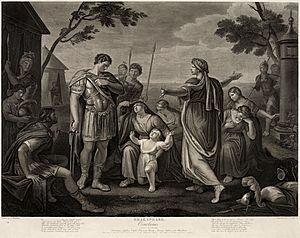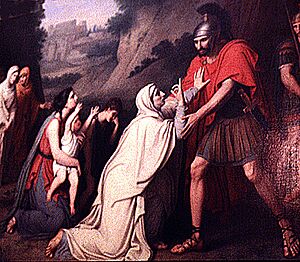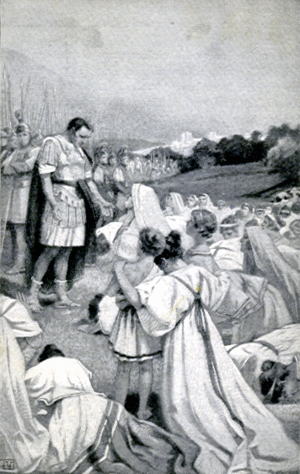Gnaeus Marcius Coriolanus facts for kids
Gnaeus Marcius Coriolanus was a famous Roman general. He lived a long time ago, in the 5th century BC. He got his special name, "Coriolanus," because he was incredibly brave during a Roman attack on the city of Corioli. This city belonged to the Volsci, who were enemies of Rome. Later, Coriolanus was sent away from Rome. He then led the Volscian army to attack his own city, Rome!
For a long time, historians believed Coriolanus was a real person. His story was told by famous writers like Livy and Plutarch. But today, some experts think he might be a legend, or that the story isn't completely accurate. Still, his tale is very famous. It even inspired William Shakespeare to write a play called Coriolanus and Beethoven to compose the Coriolan Overture.
Contents
The Story of Coriolanus
What Was His Name?
Coriolanus is usually called Gnaeus. This is the name given by the Roman historian Livy. But a Greek writer named Dionysius of Halicarnassus called him Gaius. This is the name Shakespeare used in his play. So, he might have been known by two different first names!
Hero at Corioli
Coriolanus became famous when he was a young soldier. This happened in 493 BC during a war with the Volsci. The Roman army, led by Consul Postumus Cominius, was trying to capture the Volscian town of Corioli.
While the Romans were busy with the attack, another Volscian army arrived. They attacked the Romans from behind. At the same time, soldiers from Corioli rushed out of their town gates. Coriolanus was on guard duty. He quickly gathered a small group of Roman soldiers. They fought bravely against the Volscians who had come out of Corioli.
Coriolanus didn't just push the enemy back. He bravely charged through the town gates! He even started setting fire to houses near the town wall. The people of Corioli cried out in fear. This made the Volscian army lose heart, and the Romans won the battle. The town was captured. Because of his amazing bravery, Marcius was given the special name "Coriolanus."
Conflict and Exile from Rome
Two years after his victory at Corioli, in 491 BC, Rome was facing a problem. There wasn't enough grain for everyone to eat. A lot of grain was brought in from Sicily. The Roman Senate, which was like a council of important leaders, discussed how to give it out.
Coriolanus had a very strict idea. He said the grain should only be given to the common people, called plebeians, if they gave up some political rights they had recently gained. These rights came from a time when the plebeians had protested and left Rome to demand fairer treatment.
The Senate thought Coriolanus's idea was too harsh. The common people were furious about his proposal. Their elected leaders, called tribunes, decided to put him on trial. The senators tried to defend Coriolanus, asking for him to be found innocent or given a light punishment. But Coriolanus refused to show up on the day of his trial. Because of this, he was found guilty. He was then sent away from Rome, into exile.
Joining the Volsci
Coriolanus fled from Rome and went to live with the Volsci, Rome's enemies. They welcomed him kindly. He stayed with their leader, Attius Tullus Aufidius.
One story says that Coriolanus put on a disguise. He went to Aufidius's home and asked for help, like someone seeking protection. Coriolanus and Aufidius then convinced the Volscians to break their peace agreement with Rome. They decided to raise an army and attack Rome.
The Volscian army, led by Coriolanus and Aufidius, marched against Roman towns and allies. They took back several towns that used to belong to the Volsci, like Satricum and Corioli. Then they captured other towns, including Lavinium and Pedum.
From there, the Volsci marched towards Rome itself and surrounded the city. They set up camp about five miles outside Rome. Coriolanus told the Volscian soldiers to attack the homes of the common people but to leave the homes of the rich, powerful families (the patricians) alone.
The Roman leaders prepared the city's defenses. But the common people begged them to ask for peace. The Senate sent messengers to the Volscian camp, but Coriolanus refused their requests. They sent messengers a second time, but they weren't even allowed into the camp. Next, Roman priests, wearing their special robes, went to the Volscians, but they also failed.
The Plea of the Women
Then, Coriolanus's mother, Veturia, and his wife, Volumnia, along with his two sons and many other Roman women, went out to the Volscian camp. They begged Coriolanus to stop his attack on Rome. Coriolanus was deeply moved by their pleas. He couldn't resist his family's tears. He decided to move the Volscian camp away from the city, ending the siege.
Rome honored these brave women. They built a temple dedicated to Fortuna, a Roman goddess, to remember their service. After this, Coriolanus's story becomes unclear. He seems to have stopped fighting in the war.
One version of the story says that Coriolanus went to Aufidius's hometown. Coriolanus had been disloyal to both Rome and the Volsci. So, Aufidius gathered support to put Coriolanus on trial. But before the trial could finish, Coriolanus was killed.
Is the Story True?

Some modern historians wonder if all parts of Coriolanus's story are true. The first detailed accounts of his life appeared about 200 years after he supposedly lived. There are not many reliable historical records from before 390 BC, when the Gauls attacked and sacked Rome.
Even if Coriolanus himself was not a real person, or if some parts of his story are legends, his tale still tells us something important. It shows us what life was like in the early 5th century BC. During that time, the Volscians were very powerful. They often attacked the region of Old Latium and were a real threat to Rome's survival. So, the story of Coriolanus might be a memory of those difficult times.
 | Kyle Baker |
 | Joseph Yoakum |
 | Laura Wheeler Waring |
 | Henry Ossawa Tanner |



